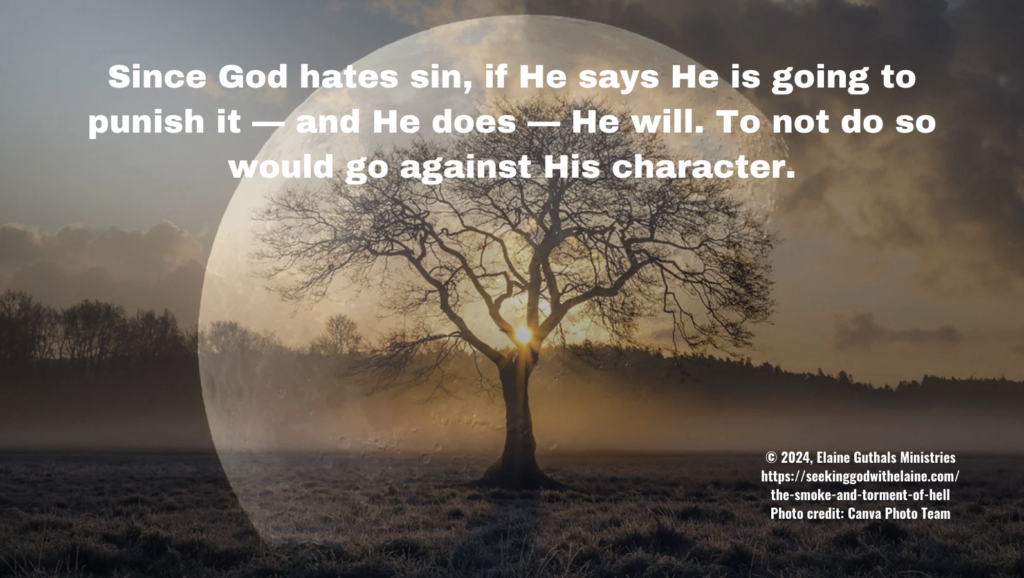Hell is a real place. This devotional reading looks at how we get to hell and how that really is justice.
Nuggets
- Many want to think that God is a loving God, incapable of punishing us — they would be wrong.
- Because God is unchanging, He will not change how salvation is gained.
- God obliterates our definition of goodness.
- Punishment provides justice.
- Regardless of the sin, it is at its basic element disobedience to God.
- God wants a relationship with us,
- God expects us to serve Him with what He has given us – and punishes us when we do not.
- We must imitate God because of our love for Him.
- Sin is going to be greatly punished.

“And another angel, a third, followed them, saying with a loud voice, “If anyone worships the beast and its image and receives a mark on his forehead or on his hand, he also will drink the wine of God's wrath, poured full strength into the cup of his anger, and he will be tormented with fire and sulfur in the presence of the holy angels and in the presence of the Lamb. And the smoke of their torment goes up forever and ever, and they have no rest, day or night, these worshipers of the beast and its image, and whoever receives the mark of its name” (Rev. 14: 9-11 ESV)
A couple of devotions ago, we talked about the third angel. The angel had a lot to say about hell.
I didn’t want to get into that then, so I tabled it – until now.
I came across a sermon on hell then and left it to look at more in depth later. Saurin said a lot of things I have to process.
Resource
The red sections are Saurin’s words.
Let's Put It into Context
To read devotions in the On the Day of the Lord theme, click the button below.
Devotions in The Harvest of the Earth series
Punishment
“It is not probable God would threaten mankind with a punishment, the infliction of which would be incompatible with His perfections.” “The idea of hell seems to you repugnant to the attributes of God, you cannot comprehend how a just God can punish finite sins with infinite pain; how a merciful God can abandon His creature to eternal miseries.”
Many want to think that God is a loving God, incapable of punishing us — they would be wrong.
This sentence is kind of confusing to read. So, let me put it in Elaine-speak.
God isn’t going to just threaten mankind with a punishment, the application of which would go against with His character.
That kind of sounds like the loving God theory is correct — but it is leaving out something — God’s wrath.
The opposite of love is wrath. We really can’t have one without the other.
If God loves purity, He hates sin. If God didn’t hate sin, it would go against His character.
God isn’t going to do that.
Since God hates sin, if He says He is going to punish it — and He does — He will. To not do so would go against His character.

God is incapable of going against His character.
That means God doesn’t threaten mankind with punishment. He promises that it will occur.
Changing His Stance
“For, if God be free to relax any part of the punishment denounced, He is equally free to relax the whole.”
Because God is unchanging, He will not change how salvation is gained.
Why is it so important that God has to keep His promise to punish sin? If He changes His outlook on sin, He may change His outlook on salvation.
God isn’t going to change His mind on the way we gain salvation.
From before the foundations of the universe, God has said that there is one way to gain salvation. “And there is salvation in no one else, for there is no other name under heaven given among men by which we must be saved” (Ac. 4: 12 ESV).
God isn’t going to go back to Jesus and say His death was for nothing. He isn’t going to change the entrance requirement for Heaven.
If He did so, God would be tolerating sin. He isn’t going to do that.
Oh, it may appear that God is tolerating sin right now because we don’t always get immediate punishment. That is where God’s grace and mercy come into play.
Goodness
“Goodness in men is a virtue of constitution which makes them suffer when they see their fellow creatures in misery, and which excites them to relieve them. In God it is a perfection independent in its origin, free in its execution, and always restrained by laws of inviolable equity and exact severity.”
God obliterates our definition of goodness.
We see goodness as an action. We see goodness as working to alleviate the pain and suffering of others.
God doesn’t look at it that way. He sees it as more of a character trait. We don’t have to wait to see someone in need of our goodness.
We are supposed to be good.
That changes how we look at Romans 8: 28. “And we know that for those who love God all things work together for good, for those who are called according to his purpose” (Rom. 8: 28 ESV).
All things — all that we experience in life — works to increase our likeness to God — if we let it. If we are loving and obeying God as we should, these experiences will help sanctify us.

Justice and Punishment
“Justice is not incompatible with eternal punishment.”
Punishment provides justice.
We tend to think of justice as the standard by which sentences are meted out for wrongs done. But it doesn’t have to just be punishment. It is also the standard by which advantages of life are distributed.
In a way, that is true. But in a way, that is a limited definition.
The Holman Bible Dictionary defined justice as “The order God seeks to reestablish in His creation where all people receive the benefits of life with Him.”
Resource
That definition shifts the emphasis of justice off God’s wrath onto God’s love.
God is wanting to reestablish His order in creation because of His love for us. He doesn’t make salvation available only to the rich or noble. It isn’t earned, so it isn’t based on ability. It isn’t about who we know or not know.
Salvation is available to add.
We can see that God distributed His benefits by need. “Then I will draw near to you for judgment. I will be a swift witness against the sorcerers, against the adulterers, against those who swear falsely, against those who oppress the hired worker in his wages, the widow and the fatherless, against those who thrust aside the sojourner, and do not fear me, says the Lord of hosts” (Mal. 3: 5 ESV).
We all need salvation. All are sinners (Rom. 3: 23).
But not all of us will choose to accept the gift of salvation. Those who do not will be opposed to the order that God is trying to reestablish.
In other words, eternally punishing those who are opposed to the order God is trying to reestablish is justice.
All Sin Is Basically the Same
“It is not the length of time employed in committing a crime that determines the degree and the duration of its punishment, it is the turpitude and atrociousness of it.”
Regardless of the sin, it is at its basic element disobedience to God.
Many may think that a murderer should be punished to a greater degree than a liar. And they probably should be.
If we look at it from God’s perspective, their sin is the same. Their sin is that they are disobedient to God.
- “You shall not murder” (Ex. 20: 13 ESV).
- “You shall not bear false witness against your neighbor” (Ex. 20: 16 ESV).
It kind of surprises me that Saurin talks about the length of time in committing the crime. We are all sinners at birth.
An 80-year-old man who make a genuine confession of faith on his deathbed is just as saved as the 5-year-old boy that makes a genuine profession of faith on the playground.
Saurin said that it is the wickedness of the crime that determines the punishment. We know that non-believers are called wicked in God’s Word.
- “A worthless person, a wicked man, goes about with crooked speech, winks with his eyes, signals with his feet, points with his finger, with perverted heart devises evil, continually sowing discord; therefore calamity will come upon him suddenly; in a moment he will be broken beyond healing. There are six things that the Lord hates, seven that are an abomination to him” (Prov. 6: 12-16 ESV).
- “Affliction will slay the wicked, and those who hate the righteous will be condemned” (Ps. 34: 21 ESV).
- “Woe to those who devise wickedness and work evil on their beds! When the morning dawns, they perform it, because it is in the power of their hand” (Mic. 2: 1 ESV).
God is more concerned about our spiritual condition than anything else in our lives.
Who Are Heathens, Jews, and Christians?
“There is an extreme difference between a heathen and a Jew; there is an extreme distance between a Jew and a Christian; and a greater still between a Christian and a heathen.”
God wants a relationship with us.
Okay. Dictionary Chick should start out with definitions.
- Heathen: someone who doesn’t belong to a common religion, especially Christian, Jewish, or Muslim.
- Jew: a group of people whose traditional religion is Judaism, who hail from the tribes that remained faithful to the line of King David (southern kingdom tribes of Judah and Benjamin).
- Christian: a believer who has received Christ through salvation.
Now we can add that information to what Saurin said.
There is an extreme difference between someone who doesn’t belong to a common religion and someone whose traditional religion is Judaism. There is an extreme difference between someone whose traditional religion is Judaism and a believer who has received Christ through salvation. There is a greater still difference between a believer who has received Christ through salvation and someone who doesn’t belong to a common religion.
That tells me God isn’t really interested in our religion. He is interested in having a relationship with us.
That also tells me God isn’t really interested in the outward appearances. He wants an inward transformation.
Our Responsibility
“The gospel-rule is, "Unto whomsoever much is given, of him shall be much required." Take this principle which Scripture establisheth in the clearest manner; press home all its consequences; extend it as far as it can be carried; give scope even to your imagination till the punishments which such and such persons suffer in hell are reduced to a degree that may serve to solve the difficulty of the doctrine of their eternity; whatever system ye adopt on this article, I will even venture to say whatever difficulty ye may meet with in following it, it will be always more reasonable, I think, to make of one doctrine clearly revealed a clue to guide through the difficulties of another doctrine clearly revealed too, than rashly to deny the formal decisions of Scripture.”
God expects us to serve Him with what He has given us – and punishes us when we do not.
Wow! That is a lot of words. Let’s break it down.
- Luke 12: 48 says we will be held responsible for what we have.
- That means that there will be consequences if we do not use for God what we have.
- We shouldn’t just do the minimum. We need to grow what we have been given.
- We should use the abilities we’ve been given to grow us to serve God rather than just escape hell and its punishments.
- Some doctrines are difficult to understand. We need to take what we understand from other doctrines and use it to understand what we do not, instead of denying the Scriptures.
We can’t just sit back and do nothing. We have to use what God has given us.
We are commanded to grow in grace and knowledge of God and Jesus.
If we do not do what God call us to do the way He call us to do it, God can have us suffer the consequences.
God’s Attributes
“We know, indeed, in general, what are the attributes of God, but we are extremely ignorant of their sphere, we cannot determine how far they extend. We know, in general, God is free, He is just, He is merciful. But we are too ignorant to determine how far these perfections must go, because the infinity of them absorbs the capacity of our minds.”
We must imitate God because of our love for Him.
We had a series where we looked at the attributes of God. We can make a list of them.
To read a related devotion, click the button below.
But we can’t quantify what God’s love is. What His mercy is. What His faithfulness is.
It’s just too much for us.
This tells me that our having the attributes isn’t enough. We can be love and show mercy to others – and the rest. If we don’t have love for and faithfulness to God, we have nothing.
Sin
“The quality of the punishments of hell is expressed in these terms — smoke, torment. These metaphorical terms include five ideas. Privation of heavenly happiness, sensation of pain, remorse of conscience, horror of society, increase of crime.”
Sin is going to be greatly punished.
Smoke and torment are going to be horrible punishments. But the ideas included in the terms make it worse.
If Heaven is continual happiness, hell is the opposite. It provides a lot of pain – and yes, those in hell are going to feel it.
It won’t matter if they are remorseful or not when they get to hell. Their eternity is set.
I am not sure what is meant by the horror of society or the increase of crime. We now that is going to happen in the end times. I don’t know what that means in hell itself.
Making the Connections
- Heaven is real.
- Hell is real.
- God’s wrath is as formidable as His love is wonderful.
- God’s standards by which we will be judged will not change.
- Banishment to hell will give us an eternity of pain.
- We choose Heaven or hell by choosing to follow God or not.
How Do We Apply This?
- Choose God.
- Grow in grace and knowledge.
- Have not only the service attributes that God has, but also the love for and faithfulness to Him.
Father God. We choose to follow You. We choose to grow in Your grace and in knowledge of You. We can’t wait to see You in Heaven. Amen.
What do you think?
Leave me a comment below (about this or anything else) or head over to my Facebook group for some interactive discussion.
If you don’t understand something and would like further clarification, please contact me.
If you have not signed up for the email providing the link to the devotions and the newsletter, do so below.
If God has used this devotion to speak with you, consider sharing it on social media.